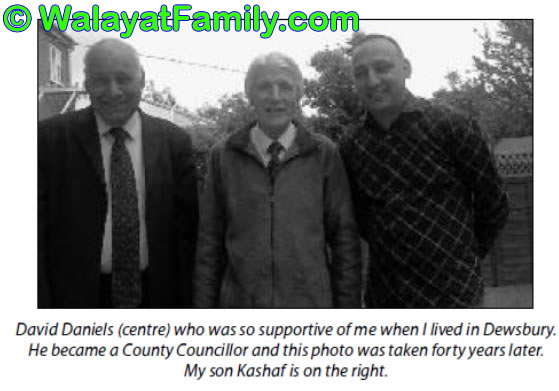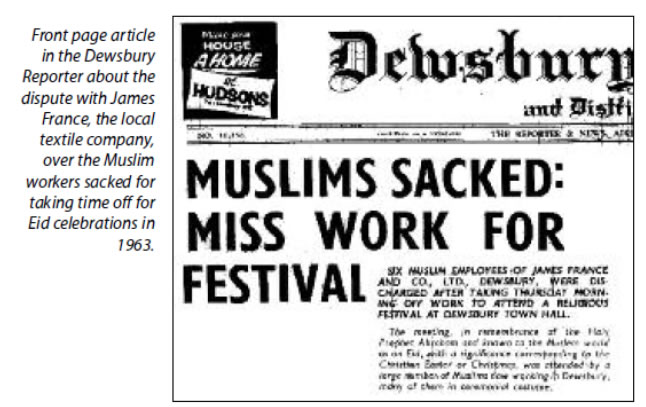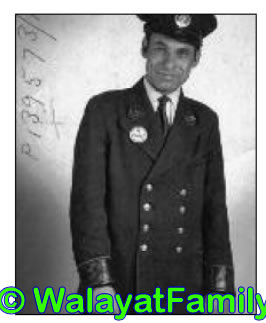News
Made in England: Awakening in Dewsbury - Chapter 5 - Made in England - The Memoirs of Dr Choudry Mohammed Walayat MBE
Four months later I said goodbye to Sheffield and was invited to go to Dewsbury by a cousin from my mother’s family, where there was work for me to do in the textile mills. We still lived ten to a house and our only recreation was to go to the Rex Cinema on Sundays, where they showed Asian films, mainly “Bollywood” films from India, but they included some Pakistani films in their programme when they could get hold of them. One of my first jobs in Dewsbury was grinding rags at Mitchell Brothers. These rags would then be re-used to produce “shoddy” cloth – the ideal material for making heavy blankets, overcoats and military uniforms, that made Dewsbury famous as the “Heavy Woollen” district of the textile industry. I only lasted a week but quickly got a similar job at Beaumont’s on Bradford Road, where there were ten machines to cut up the rags and I worked on them and also in the laundry. The longest job I had at this time was at Mogashell’s where I worked for eight months in 1962, serving some of my time acting as a clerk, for which I was well qualified.
This period in the “Rag Trade” brought it home to me how there were only unskilled jobs available for Pakistanis, even if, like me, you were quite well qualified. Still I was unprepared for what happened next. One day feeling cold and hungry I went into a café in the centre of Dewsbury looking for a cup of tea, which was about all I could afford. The owner refused to serve me, saying that they did not serve “coloured” people. I was dumbfounded and stumbled out of the café desperately upset and humiliated. Until such a thing happens to you it is difficult to understand how such a rejection, just for being a member of a particular ethnic group, can so undermine your self-esteem and confidence. I was disgusted with Britain. This was the country that I had held in such high regard, that had built an Empire that encompassed a quarter of the world’s population and thought of itself as civilised. This was the way they could treat, with such contempt and disrespect, another Commonwealth citizen.
I resolved not to accept this insult. It was no good going to members of my own community because they would have only blamed me for going to an “English” café in the first place. They preferred to keep their heads down, keep themselves to themselves and not provoke the local white population. I could not appeal to the Race Relations Board or CRE or indeed any relevant legislation, because all that was in the future, so I decided to take my story to the Young Socialists.
This may seem a little unusual now, but I knew all English people did not think like the café owner. I knew that the Labour Party, to whom the Young Socialists were affiliated, had long been supporters of independence for India and Pakistan and were always against racial discrimination. In northern towns like Dewsbury they were clearly the party of the working class and I was working class too, now I was in Britain.
The Young Socialists, led by their Chairman, David Daniels, a young man whom I came to know well, agreed to back me up. Shortly afterwards some members went down to the café with me and we all lined up and made an order. I was halfway along in that line and when it was my turn to be served the owner just handed me what I wanted. He was too scared to throw me out now. It was a minor triumph in itself, but a big victory against racism in that café, and in Dewsbury itself it was a significant start in breaking the colour bar in the town.
A Political Activist is Born
It also marked the start of my career as a political activist. From now on wherever I saw unfairness and discrimination I would stand up and be counted. I got myself involved in the Young Socialists. I was their first Asian member and we could learn from each other. In the Sixties some Young Socialist branches became a real headache for the Labour Party by their uncompromising radical stand on all issues. However, the Dewsbury branch at that time was loyally working to overthrow the Conservative Government and hoping to put a fellow Yorkshireman, Harold Wilson, from just up the road in Huddersfield, into Number 10. The branch attracted a lot of big name speakers, many of them with Yorkshire constituencies, such as Dennis Healey, who many believe is the best Prime Minister Britain never had, and Dr. Edith Summerskill, the Halifax MP, who was nationally famous for her stand against the sport of Boxing. They also invited Wilson himself, still the Leader of the Opposition until 1964, and his deputy George Brown, full of energy and passion and no little alcohol, to speak and fire the imaginations of the young Dewsbury members. They certainly inspired me, demonstrating what politics could be and what organised political parties could achieve, especially as I had come from a country that had been under military rule since 1958, when General Ayub Khan had declared martial law.

The Young Socialists broadened my social life as well and introduced me more to the ways of English people, something most Pakistanis in Dewsbury would not have had the opportunity to experience. I was asked to judge a dance contest on the grounds that I was a neutral, although I had no idea about dancing as practised by these young people. I gave the prize to the prettiest girl. David Daniels helped me with simple things like the use of a knife and fork. It seems odd to English people but I had never used them in Pakistan, where we ate with our fingers, or scooped food up with a chapati, or occasionally a spoon. Knife and forks looked as unusual to me as chopsticks to Europeans. He also taught me to tie a tie, which again I had never worn in Pakistan, but which were even more common in England than they are now. In return I taught Urdu to some of the Group, especially to Donny McLaughlin, a young Scotsman who was standing for the Council, and who wanted to be able to communicate with the Pakistani community. Subsequently he did get elected, along with David Daniels, to Dewsbury Council, which was a County Borough in its own right in those days before Local Government was re-organised by the 1972 Act.
Through the tutelage of David Daniels and the other Young Socialists, I considered forming an association to represent Pakistani Muslims in the town. I was now quite well known and believed people in the community would respond to my lead, so we set up the Pakistan Muslim Welfare Association and drew about fifty members, mainly younger people. The “Welfare” part of the title was important because one of the practical ways we could support members was by helping them with their problems, many of which stemmed from not speaking English. I was able to play a big part here, and it was direct practical help, which was much appreciated. One of our initial successes, again very practical and meeting a clear need of the community, was to buy a small area of land for £60 which we could use as a dedicated Muslim cemetery. It was not a large site but it could accommodate ten to fifteen graves and that was about all we needed for the immediate future.
The Battle over the Eid Sackings
In April 1963, sixMuslimemployees of the large family textile firm, James France and Co. were sacked after taking the morning off to attend prayers at the Eid-ul- Fitr festival following Ramadan. For Muslims this is one of the most important duties of the year, as important as celebrating Christmas or Easter to Christians. On behalf of the Pakistan Muslim Welfare Association I rushed to their defence. The issue was crucially important, because it was a relatively new situation in Britain, where people of another deeply held faith wanted some recognition of their significant religious festivals. None was more important to Muslims than Eid, which celebrates the remembrance of the Holy Prophet Abraham, who is a key figure in the three religions of Christianity, Judaism and Islam.
The incident and our protests made the front-page story in the Dewsbury Reporter and the firm was forced on to the defensive. John France, a director of the firm, argued that the men had sacked themselves by not turning up for work. He added that the firm was therefore within its rights not to give them a week’s notice or a week’s pay in lieu of notice. There had been forty Pakistani men who had asked for time off but the firm had refused them, claiming that they had given insufficient notice. Six devout men had defied the ban and had absented themselves and gone along to the Eid prayers, which were held at the Town Hall, further underlining the significance of the occasion.

The Pakistan High Commissioner came up from London and discussed the situation with me and gave his support to our association’s actions. It was all getting a bit heavy for James France and Co., so they re-instated the six men and we set about drawing up some new procedures so we would have no difficulties in the future. This direct action, which had been conducted firmly but with the correct dignity, won our association some considerable prestige. I personally gained some valuable understanding of how to use the media, confidence in making effective speeches, and grasped the importance of gaining support from the local authorities, who were almost always Labour controlled in Northern towns and cities.
“Transferred” to Nottingham
In the Summer of 1963 I was invited by a leading Pakistani academic in England to join him in Nottingham and work for his campaign for Kashmir independence. He was Ghazi Rehman and he was the chair of the Kashmir Independence Movement, an organisation dedicated to keeping the Kashmir issue alive in Britain, embarrassing the Indian Government, who hung on to “occupied” Kashmir in defiance of the will of the overwhelming majority of the population in their part of the state.
Ghazi Rheman was a dynamic, charismatic leader of the movement, who had heard of the progress I was making in Dewsbury and felt that I should use my newly emerging talents on a wider stage. So he drove over to the West Riding and picked me up in his car, packed all my belongings into the boot and took me back to Nottingham. As he was a fairly wealthy man, he owned a number of houses and he put me up in one of them. I was appointed as the General Secretary of the Kashmir Independence Movement, a grand and imposing title, but not a job that carried a salary, so he arranged for me to get a job on the buses as a conductor.
I enthusiastically settled down to succeed in these two new roles, by day working on the buses, but in my spare time organising the campaign to free Kashmir. The first job was easier than the second, but we persevered with a well thought-out campaign that was only limited by our financial and human resources. We organised demonstrations outside India House in the Aldwych in London, held meetings in Pakistani communities across England and made regular representations to the British Government. When Wilson’s Labour Government came to power in 1964, we hoped we would have more success with the British Government, but Kashmir did not seem very high on their agenda despite sympathetic noises. As the former colonial power they would tread carefully around such a bitter issue between two Commonwealth countries, and it was clearly their number one priority to stay on friendly terms with both countries. So, despite all our committed, energetic work we did not manage to free Kashmir in the middle Sixties and others, even more powerful than ourselves, have not succeeded yet.
 The two years I spent in Nottingham
were very happy times for me. I was mixing
with people in the movement who were
intellectually stimulating, many from well
educated backgrounds, and it all encouraged
my understanding of community politics and
my own personal development as I
approached my thirtieth birthday. I enjoyed
working on the buses. I met a lot of different
English people and enjoyed a joking rapport
with most of them. Some folks were not so pleasant but they, as always, were a minority and when the bus was not very
full I could sit down and read my newspaper, which was something a driver
could not do. It was far better than being cooped up in a factory, especially the
Victorian factories that I had known in Yorkshire. On the other hand I did
nearly lose my life when I was thrown from the rear platform when my bus
crashed. There were no doors at the rear entrance of the bus in those days, and
as I was not expecting an accident I was catapulted onto a traffic island where
I lay inert and apparently dead. The passengers gathered round concerned and
horrified that I was indeed dead, but after a short while I got to my feet and
despite the nasty fall seemed to be none the worse for the experience.
The two years I spent in Nottingham
were very happy times for me. I was mixing
with people in the movement who were
intellectually stimulating, many from well
educated backgrounds, and it all encouraged
my understanding of community politics and
my own personal development as I
approached my thirtieth birthday. I enjoyed
working on the buses. I met a lot of different
English people and enjoyed a joking rapport
with most of them. Some folks were not so pleasant but they, as always, were a minority and when the bus was not very
full I could sit down and read my newspaper, which was something a driver
could not do. It was far better than being cooped up in a factory, especially the
Victorian factories that I had known in Yorkshire. On the other hand I did
nearly lose my life when I was thrown from the rear platform when my bus
crashed. There were no doors at the rear entrance of the bus in those days, and
as I was not expecting an accident I was catapulted onto a traffic island where
I lay inert and apparently dead. The passengers gathered round concerned and
horrified that I was indeed dead, but after a short while I got to my feet and
despite the nasty fall seemed to be none the worse for the experience.
Whether it was this event that made me consider my position in life, or a little bit of homesickness, I decided it was time that I went back to Pakistan for a while. I wanted to see my family and friends again, tell them how I had been getting on and what Britain was like. How everyone was so law abiding, how the vast majority of the people were helpful and well-behaved, especially the police. There was a bit of me that wanted to show off how I had coped in that strange land four thousand miles away. Although I was not particularly looking for a bride, I was now nearly thirty and if the right girl came along, I might consider getting married and start a family. I had not thought much about this when in Britain, although if I had met the right Pakistani, or even English, girl in Dewsbury or Nottingham, I might have considered marriage. If I had married an English girl that would have been quite a big step, and she would have had to convert to Islam when we got married.
So, after four interesting years in Britain I flew back to Islamabad airport and travelled home to Kashmir, not certain whether I would ever come to live in the U.K. again.
By Dr. Choudry M. Walayat MBE
Copyright 2009 - Dr. Choudry M. Walayat MBE
You May contact Choudry Walayat on his Mobile - 07941016417 (UK)
-------------------------------------------------------------------------------------
All rights reserved. No part of this online book may be reproduced, stored in a retrieval system or transmitted in any form or by any means, electronic or mechanised, by photocopying, recording or otherwise without the prior written consent.
Online Copy Published by Nadeem Walayat - Contact admin@REMOVEwalayatfamily.com
Hard Copy Published by Kashaf Walayat - ISBN Number 978-0-9560445-0-1 - Contact on Mob. No. 0044 7766 22 1006
All facts and opinions in this book are the sole responsibility of Dr. Choudry M. Walayat. The book has been written in co-operation with John Cornwell, who produced the final texts of the chapters of the book.
